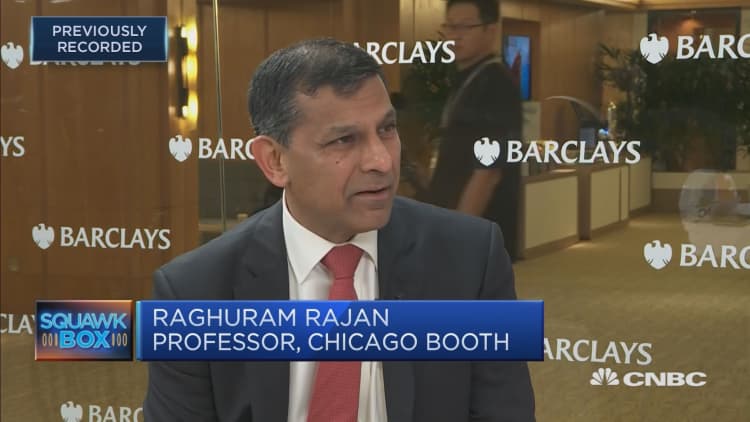
India needs to clean up its troubled financial sector fast in order to get economic growth back on track, says a former governor of the Reserve Bank of India, Raghuram Rajan.
Rajan served as RBI governor for three years — from Sept. 2013 to Sept. 2016. During his tenure, the central bank told troubled Indian lenders to clean up their books, which included identifying non-performing assets.
"There's a clean-up which we started, which is underway, which needs to be completed fast," he told CNBC's Nancy Hungerford on Thursday. "The recapitalization has to be done, but it also has to be done in the non-bank financial sector, which is seizing up."
"You need to clean up, get the banking system, get the financial system going again if you want stronger growth," Rajan said.
India's banking system has lost $24.8 billion due to non-performing loans of 416 defaulters being written off, CNN-News18 reported earlier this month.
The government has pumped in billions of dollars to help debt-laden state lenders in exchange for them implementing reforms. Public sector lenders are said to have the highest exposure to bad loans, and experts have said the sheer volume of bad debt remains high.
We need to clean up, but also clean up the new risks that have emerged ... in the nonbank financial system. If we don't do that, the financial system is going to be an overhang over the economy.Raghuram Rajanformer governor of the Reserve Bank of India
Under Rajan's successor Urjit Patel, the RBI tightened regulation last February, which stopped banks from using loan restructuring schemes to delay recognizing bad debt.
However, those guidelines were scrapped by India's top court in April.
India's non-banking financial sector is also facing a crisis as many non-bank lenders struggle with bad assets and corporate governance issues, according to reports.
'Worst phase'
Earlier this month, Indian Finance Minister Nirmala Sitharaman said public sector banks had their "worst phase" during Rajan's tenure at the central bank, local media reported.
When asked about those comments, Rajan pointed out that most of his term as RBI governor was served under Indian Prime Minister Narendra Modi's government, which won power in 2014.
India's banking troubles began in 2007 and 2008, before the global financial crisis, when a lot of investments were made, Rajan explained. Those investments created a lot of bad loans that needed to be cleaned up in order to spur lending. Banks are the biggest source of funding for Indian companies.
"There are people who say, why did we clean up? We could have gone on," the former RBI governor said. "We simply couldn't have gone on because banks were stopping lending because their balance sheets were getting clogged with non-performing assets."
"So, you had to force the recognition and the recapitalization to set them back on track — that is a half-finished job right now. It has to be finished," Rajan added. "We need to clean up, but also clean up the new risks that have emerged, for example, in the non-bank financial system. If we don't do that, the financial system is going to be an overhang over the economy."
More reforms
India is undergoing a major slowdown — growth hit a six-year low in the April-to-June quarter, where the economy grew 5% from a year ago. Even then, the way India calculates its GDP has been called into question by some.
Rajan said that if the economy doesn't grow at a pace above 5%, it will be hard to create enough jobs to keep people employed. "We're adding one million people to the workforce every month, so, in that sense, I think India needs far stronger growth," he said.
But growing the economy at a faster clip also requires "another generation of reforms," he said.
"Good news: The government has the political strength and the power to undertake those reforms. Bad news: (It) hasn't done so, so far," he added.


